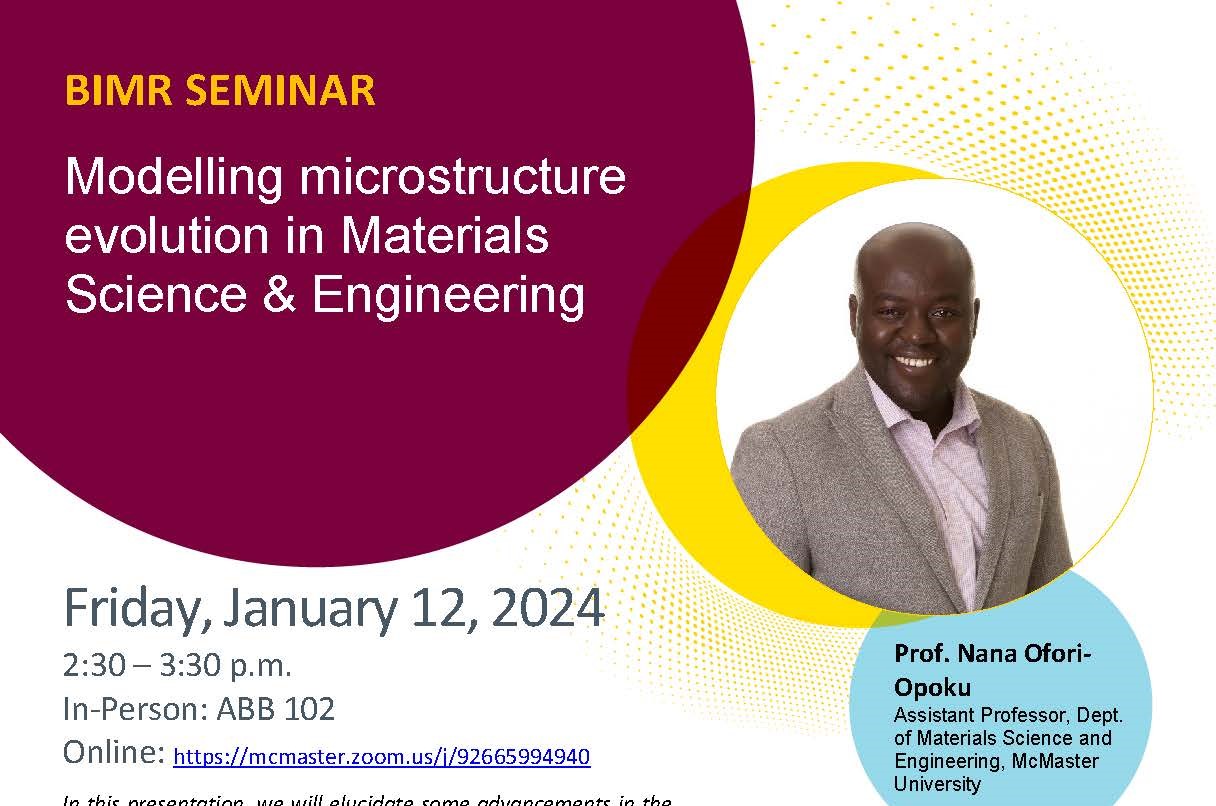Modelling microstructure evolution in Materials Science & Engineering
Jan 12, 2024
2:30PM to 3:30PM

Date/Time
Date(s) - 12/01/2024
2:30 pm - 3:30 pm
Categories
Prof. Nana Ofori-Opoku
Dept. of Materials Sciences and Engineering, McMaster University
In this presentation, we will elucidate some advancements in the prediction of materials microstructure, spanning diverse length and time scales, using sophisticated computational methodologies. We begin at the micron scale, focusing on microstructure predictions during solidification processes—illustrated through the paradigm of additive manufacturing. Delving into the intricacies of pattern formation and length scale selection, we interrogate their dependence on processing conditions and build direction. Following the solidification process, we transition to the atomic level, where our attention will shift to precipitation reactions in the solid state. Here, we’ll gain insights into the nuanced behaviour of materials at the atomic scale, particularly as influenced by material defects. These observations contribute to our understanding of mechanisms leading to strengthening and hardening behaviour. Our final example returns us to the micron length scale, where we will revisit the theoretical underpinnings of our modelling tools. This reassessment aims to optimize these tools such that they can be confidently applied to microstructure prediction in extreme and driven environments, such as those encountered in nuclear reactors. By the end of our journey through materials microstructure, we will have gained some theoretical insights and computational tools, that we hope help to elucidate, predict, and optimize materials behaviour across varying conditions and scales.
Bio:
Nana Ofori-Opoku is an assistant professor at McMaster University’s Department of Materials Science and Engineering, with a strong background in high-performance computing and modelling at the microstructural level. His expertise in developing microstructural and modelling frameworks has enabled him to study various problems in materials science, including solidification processes, materials microstructure evolution, and phase transformations. Nana has also made contributions to the field of additive manufacturing, also known as 3D printing. He has developed and applied phase-field methods to simulate and optimize the solidification of 3D printed materials, providing new insights into the microstructural evolution and the consequent mechanical behaviour of additively manufactured parts. Nana’s work has resulted in a greater understanding of the complex interplay between process parameters and microstructure in additively manufactured parts. Specifically, he has investigated the formation and behaviour of defects such as pores, cracks, and voids in additively manufactured materials, which are critical to the mechanical properties of these parts. His research has also explored the effect of microstructure on the performance of additively manufactured parts, including the effects of crystal orientation, grain size, and build direction.
In-Person: ABB 102
Online: https://mcmaster.zoom.us/j/92665994940
Meeting ID: 926 6599 4940
Passcode: 442536

